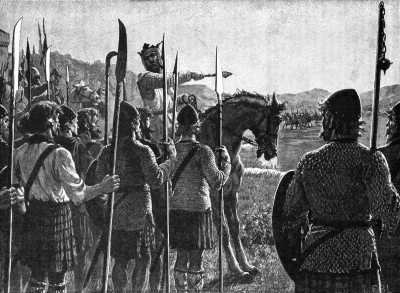The Weardale campaign, part of the First War of Scottish Independence, occurred during July and August 1327 in Weardale, England. A Scottish force under Lord Douglas and the earls of Moray and Mar faced an English army commanded by Roger Mortimer, 3rd Baron Mortimer, accompanied by the newly crowned Edward III.
In 1326 the English king, Edward II, was deposed by his wife, Isabella, and her lover, Mortimer. England had been at war with Scotland for 30 years and the Scots took advantage of the chaotic situation to launch large raids into England. Seeing opposition to the Scots as a way of legitimising their position, Isabella and Mortimer prepared a large army to oppose them. In July 1327 this set off from York to trap the Scots and force them to battle. After two weeks of poor supplies and bad weather the English confronted the Scots when the latter deliberately gave away their position.
The Scots occupied an unassailable position immediately north of the River Wear. The English declined to attack it and the Scots declined to fight in the open. After three days the Scots moved overnight to an even stronger position. The English followed them and, that night, a Scottish force crossed the river and successfully raided the English camp, penetrating as far as the royal pavilion. The English believed that they had the Scots surrounded and were starving them out, but on the night of 6 August the Scottish army escaped and marched back to Scotland. The campaign was ruinously expensive for the English. Isabella and Mortimer were forced to negotiate with the Scots and in 1328 the Treaty of EdinburghNorthampton was signed, recognising Scottish sovereignty.
The First War of Scottish Independence was the first of a series of wars between English and Scottish forces. It lasted from the English invasion of Scotland in 1296 until the de jure restoration of Scottish independence with the Treaty of Edinburgh–Northampton in 1328. De facto independence was established in 1314 at the Battle of Bannockburn. The wars were caused by English kings attempting to establish their authority over Scotland while Scots fought to keep English rule and authority out of Scotland.The term "War of Independence" did not exist at the time. The war was given that name retrospectively many centuries later, after the American War of Independence made the term popular, and after the rise of modern Scottish nationalism.

 English
English  español
español  français
français  português
português  русский
русский  العربية
العربية  简体中文
简体中文 
